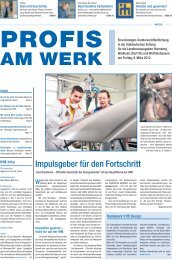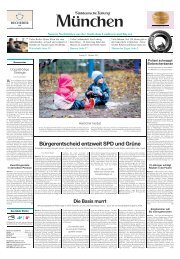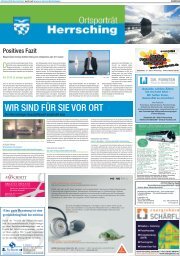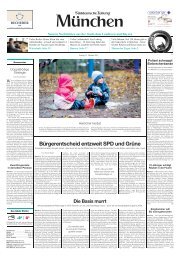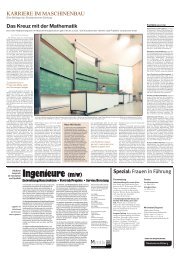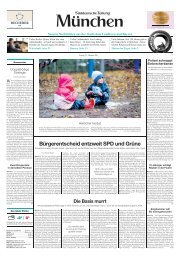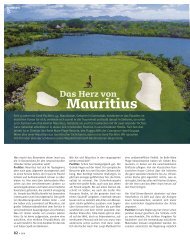Fußball-Wm 2006 angeblich gekauft
Fußball-Wm 2006 angeblich gekauft
Fußball-Wm 2006 angeblich gekauft
Erfolgreiche ePaper selbst erstellen
Machen Sie aus Ihren PDF Publikationen ein blätterbares Flipbook mit unserer einzigartigen Google optimierten e-Paper Software.
MONDAY, JULY 16, 2012 Copyright © 2012 The New York Times<br />
Zoos Struggle to Breed<br />
Rare Species in Captivity<br />
By LESLIE KAUFMAN<br />
FRONT ROYAL, Virginia — With extinctions<br />
rising and habitats being destroyed,<br />
zoos are trying to breed about<br />
160 endangered species.<br />
But 83 percent of those species in North<br />
American zoos are not meeting the targets<br />
set for maintaining their genetic<br />
diversity, the Association of Zoos and<br />
Aquariums reports.<br />
After two decades, the captive population<br />
of 281 cheetahs in North America<br />
gives birth to only 15 cubs, on average, a<br />
year, half of what is needed to maintain a<br />
healthy replacement level. And they are<br />
not nearly as difficult to breed as pandas,<br />
which last produced a cub in captivity in<br />
America in 2010.<br />
Zoos must learn to mate animals as socalled<br />
insurance populations, before their<br />
situation in the wild becomes untenable,<br />
said Jack Grisham, who coordinates the<br />
association’s cheetah breeding plan. The<br />
disappointing success rate has led many<br />
to say they would prefer to see the money<br />
Captive cheetahs don’t<br />
reproduce quickly enough<br />
to ensure their future.<br />
go to preserving wild habitats and species.<br />
“I’d be happier about captive breeding<br />
if I thought it helped wild cheetahs,” said<br />
Luke Hunter, president of Panthera, a<br />
nonprofit group with offices in New York<br />
and London that works on global conservation<br />
efforts for big cats in the wild, including<br />
cheetahs. “Free of threats, they<br />
breed like rabbits in the wild. They don’t<br />
need supercostly assisted reproduction<br />
— they need a place to roam.”<br />
Each year the Smithsonian’s National<br />
Zoo in Washington spends about $350,000<br />
on breeding cheetahs at its 1,300-hectare<br />
campus here in Front Royal, which houses<br />
18 other species. Similar programs exist<br />
at four other centers run by zoos.<br />
At the turn of the 20th century, roughly<br />
100,000 cheetahs roamed from Africa to<br />
the Mediterranean to India, according<br />
to the Smithsonian. Today, experts estimate<br />
7,000 to 10,000 remain in the wild as<br />
a result of habitat loss, poaching, and conflicts<br />
with farmers and ranchers.<br />
Mr. Grisham said the pressures on<br />
animals in the wild are so great that zoo<br />
The summer vacation season in the<br />
United States is under way and many are<br />
planning to go … nowhere.<br />
LENS<br />
The Travel Channel<br />
tries to inspire<br />
people to get off their<br />
couches, featuring<br />
shows like “Extreme<br />
Water Parks,” which<br />
takes the audience to<br />
the world’s highest and<br />
steepest water slide in<br />
Fortaleza, Brazil, and<br />
“Trip Flip,” where those already on vacation<br />
are upgraded to the swankiest hotels<br />
For comments, write to<br />
nytweekly@nytimes.com.<br />
animals may someday have to serve as a<br />
genetic insurance bank.<br />
In a closed population, as in zoos, the<br />
priority is high levels of genetic diversity<br />
to maintain a species’ adaptability and<br />
prevent inbreeding. The result is a kind<br />
of reverse natural selection, with the animals<br />
with the lowest rate of success vaulting<br />
to the top of the priority list because of<br />
the rareness of their genes.<br />
Many zoos do not have enough genetic<br />
variation to ensure long-term survival<br />
in captivity. “Noah got it all wrong,” said<br />
Sarah Long, director of the Population<br />
Management Center in Chicago. “One or<br />
two or even a dozen of each species is not<br />
enough.”<br />
The association runs nearly 600 cooperative<br />
breeding programs, but so far<br />
has formal breeding plans for only 357<br />
species. About 55 percent of those species<br />
with plans are considered imperiled<br />
in the wild by the International Union for<br />
Conservation of Nature, among them the<br />
western lowland gorilla and the scimitarhorned<br />
oryx.<br />
Still, 40 percent of those 357 managed<br />
populations are dwindling. The number<br />
of Andean bears is shrinking because<br />
zoos scaled back breeding years ago and<br />
the population has become too old to reproduce.<br />
The Nile lechwe, an antelope,<br />
is believed to be suffering in captivity<br />
because zoos are allocating less space to<br />
rare hoofed species.<br />
Researchers lack adequate knowledge<br />
on artificially inseminating many exotic<br />
animals, so for now, most zoo animals<br />
mate the old-fashioned way, which presents<br />
its own logistical puzzles.<br />
An institution may be reluctant to give<br />
up a popular chimp or penguin. Animals<br />
available from overseas can be blocked<br />
by agricultural treaties, diplomatic problems<br />
or quarantines.<br />
And animals, like humans, have their<br />
own ideas about their mates.<br />
African penguins are generally monogamous.<br />
At the New England Aquarium in<br />
Boston, they are paired by keepers with<br />
an appropriate genetic match.<br />
But some 25 percent of the time the penguins<br />
refuse the designated suitor.<br />
Researchers are still trying to master<br />
the dynamics of cheetah mating, said<br />
Adrienne Crosier, director of the National<br />
Zoo’s cheetah breeding program.<br />
For decades, zoos housed and treated<br />
all big cats similarly. But their mating<br />
patterns can be radically different. For<br />
example, clouded leopards, a critically<br />
Con tin ued on Page 4<br />
LUKE SHARRETT FOR THE NEW YORK TIMES<br />
Zoos are trying to mate animals before their situation in the wild becomes<br />
and dine at the best restaurants. But Neil<br />
Genzlinger writes in The Times that producers<br />
of these shows fail to understand<br />
the American sensibility.<br />
“There’s nothing mainstream Americans<br />
like better than listening to, and<br />
hanging out with, people exactly like<br />
themselves,” Mr. Genzlinger wrote. “That<br />
means we don’t want shows about exotic<br />
adventures; what we want is a Staycation<br />
Channel.”<br />
These days many Americans are just<br />
happy to have a job and fear time away<br />
from the office may become permanent if<br />
the boss notices they aren’t really missed.<br />
Even President Obama, whose job security<br />
is an open question, is forgoing his annual<br />
beach getaway to the upscale island<br />
Articles selected for<br />
7471 ADULT – COLLEGE GRADUATE<br />
7476 MARITAL – DIVORCED<br />
7729 STRANGE AND UNUSUAL<br />
2200 ALLERGY RELATED<br />
8740 ETHNIC CODE – SURNAME<br />
8666 PC OPERATING SYSTEM<br />
9515 GENDER – 1ST INDIVIDUAL<br />
4000 CONSUMER PROMINENCE INDICATOR<br />
8531 VOTER/PARTY – INPUT INDIVIDUAL<br />
2775 TEXT MESSAGING<br />
9358X HEAVY TRANSACTORS<br />
7773PETS–CATOWNER<br />
2776 LIVING GREEN<br />
8591HOMEPOOLPRESENT<br />
9520 HEIGHT – 1ST INDIVIDUAL<br />
9351X UNDERBANKED INDICATOR<br />
7750 EXERCISE – RUNNING/JOGGING<br />
7820GAMING–CASINO<br />
8618 MAIL ORDER BUYER<br />
2203 DIABETIC FOCUS<br />
8597 HOME BEDROOM COUNT<br />
7057 SMOKER IN THE HOUSEHOLD<br />
8688 GENDER – INPUT INDIVIDUAL<br />
3436DISCRETIONARYINCOMEINDEX<br />
8602CHILDREN–NUMBERINHOUSEHOLD<br />
7764 MOVIE COLLECTOR<br />
8556 TRUST OWNED<br />
2061CREDITCARDUSE–ISSUER–MASTERCARD<br />
2301 INTERNET PROVIDER (IP)/DOMAIN EMAIL<br />
2534 PURCHASE – MONTHS SINCE LAST PURCHASE<br />
7789 COLLECTIBLE – STAMPS<br />
2800XINVESTORS–STOCKS/BONDS–PLUS<br />
2104 INFOBASE ETHNICITY – HISPANIC<br />
7771DIETING/WEIGHTLOSS<br />
7842 CHRISTIAN FAMILIES<br />
7472 ADULT – EMPTY NESTER<br />
IntellIgence: Britain’s weepy Wimbledon moment, Page 2.<br />
Putting Away Work and Learning How to Vacation<br />
of Martha’s Vineyard.<br />
Marketers have noticed, Tanzina Vega<br />
reported in The Times. They are rolling<br />
out commercials that urge “workers to<br />
commit small acts of so-called rebellion —<br />
like taking a vacation, or going on a lunch<br />
break.”<br />
In a television ad for Las Vegas, one<br />
worker climbs on her desk in a busy office<br />
and yells: “I have 47 vacation days. That’s<br />
insane. Let’s take back our summer!” She<br />
holds up a sign that says “Vacation Now.”<br />
“Who’s with me?’ ” she asks. Some applaud.<br />
The rest look away.<br />
Part of the problem may be that many<br />
of us just don’t know how to “take back the<br />
summer.” Times reporter Matt Richtel had<br />
that problem in Hawaii. A seven-day break<br />
in March to enjoy the islands was spent<br />
checking his phone, lamenting the rain<br />
and dealing with his jet-lagged toddlers.<br />
He wrote: “I had hoped to return home at<br />
peace. Instead I was exhausted, defeated<br />
and irritable.”<br />
So for his next trip, Mr. Richtel consulted<br />
with experts, who were kind enough not to<br />
point out that if he needed advice on how to<br />
relax, that might be part of the problem.<br />
¶ Learn to turn off the racing mind on a<br />
daily basis; that way when you do finally<br />
go away, you’ve had some practice at relaxing.<br />
Deep breathing works.<br />
¶ Get away from your daily routine.<br />
Leaving home is not enough; leave your<br />
phone in your pocket as well.<br />
¶ Accept the boredom. It’s O.K. to do<br />
2708 SOCIAL NETWORK – FACEBOOK<br />
2403 CONGRESSIONAL DISTRICT<br />
21O4 INFOBASE ETHNICITY – HISPANIC<br />
9545 WEIGHT – INPUT INDIVIDUAL<br />
7774PETS–DOGOWNER<br />
2058CREDITCARDUSE–ISSUER–AMERICANEXPRESS<br />
38659APARTMENTNUMBER<br />
9356X NET WORTH GOLD<br />
9032XNEWVEHICLEBRAND<br />
AFFINITY RANK – HONDA<br />
7722 SMOKING/TOBACCO<br />
7776 HOUSE PLANTS<br />
1805 FAMILY TIES: ADULT W/WEALTHY<br />
PARENT – INPUT INDIVIDUAL<br />
3410 CHARITABLE GIVING SCORE<br />
8560HOMEHEATSOURCE<br />
2802ITASCORE–REQUIRESAPPROVAL<br />
8611 DATE OF BIRTH – 1ST INDIVIDUAL<br />
8654 PC DSL/HIGH SPEED USER<br />
7820GAMING–CASINO<br />
9350 ECONOMIC STABILITY INDICATOR<br />
9650XEDUCATION–1STINDIVIDUAL–PLUS<br />
8337XINVESTORS–HIGHLYLIKELY<br />
3448 ADVERTISED PRESCRIPTION REQUESTERS<br />
9500CORRECTIVELENSES–1STINDIVIDUAL<br />
8258 HOME VIDEO RECORDING<br />
2522VACATION–TYPE–CANADA<br />
7478 NEW MOVER<br />
7742FOOD–VEGETARIAN<br />
9780 EMAIL APPEND AVAILABLE INDICATOR<br />
8713 HOME ASSESSED VALUE – ACTUAL<br />
7752 EXERCISE – AEROBIC/CARDIOVASCULAR<br />
7821 SWEEPSTAKES/CONTESTS<br />
8339 INVESTORS – LIKELY<br />
2510 READ BOOKS OR MAGAZINES ON TRAVEL<br />
3588MEDIACHANNELUSAGE–CELLPHONE<br />
8618 DATE OF BIRTH – 2ND INDIVIDUAL<br />
7783SPECTATOR–BASEBALL<br />
7602XCHILDREN–NUMBER<br />
INHOUSEHOLD–100%<br />
2066 GAMBLING<br />
Mapping the Consumer Genome<br />
nothing. Don’t replace your work obsession<br />
for a vacation schedule full of pilates<br />
classes and kite-sailing lessons.<br />
¶ Don’t try to work when you are off.<br />
Jonathan Schooler, a psychology profes-<br />
They Know<br />
And Sell All<br />
About You<br />
By NATASHA SINGER<br />
IT KNOWS WHO you are. It knows<br />
where you live. It knows what you<br />
do. The odds are that it knows things<br />
like your age, race, sex, weight, height,<br />
marital status, education level, politics,<br />
buying habits, household health worries,<br />
vacation dreams — and on and on.<br />
Few consumers have ever heard of<br />
Acxiom Corporation, which is based in<br />
Little Rock, Arkansas, but has offices<br />
in Australia, New Zealand, France,<br />
Germany, Britain, Poland, Brazil and<br />
China. Analysts say it has amassed the<br />
world’s largest commercial database<br />
on consumers — and that it wants to<br />
know much, much more. It has more<br />
than 23,000 servers processing more<br />
than 50 trillion data “transactions” a<br />
year. Company executives have said its<br />
database contains information about<br />
500 million active consumers worldwide,<br />
with about 1,500 data points per<br />
person.<br />
Such large-scale data mining and analytics<br />
— based on information available<br />
in public records, consumer surveys<br />
and the like — are perfectly legal in the<br />
United States. Acxiom’s customers have<br />
included big banks like Wells Fargo<br />
and HSBC, investment services like<br />
E*Trade, automakers like Toyota and<br />
Ford, department stores like Macy’s —<br />
just about any major company looking<br />
for insight into its customers.<br />
For Acxiom, the setup is lucrative. It<br />
posted a profit of $77.26 million in its<br />
latest fiscal year, on sales of $1.13 billion.<br />
But such profits carry a cost for consumers.<br />
Authorities in the United States<br />
say present laws may not be equipped to<br />
handle the rapid expansion of an industry<br />
that often collects and sells sensitive<br />
financial and health information yet is<br />
untenable. A baby cheetah at the National Zoo in Washington. MINH UONG/THE NEW YORK TIMES<br />
Con tin ued on Page 4<br />
World trends<br />
3<br />
money & BusIness<br />
5<br />
arts & styles<br />
6<br />
Defiant climbers<br />
Harvesting hair in<br />
The expert who<br />
scale Cuban cliffs. Cambodia to sell.<br />
shapes stars’ voices.<br />
MARCO GARCIA FOR THE NEW YORK TIMES<br />
Staying connected while on holiday is<br />
a good way to ruin a nice beach.<br />
sor at the University of California at Santa<br />
Barbara, learned the last lesson the hard<br />
way. During a recent family trip to Norway<br />
he thought he could fit in a little work, he<br />
told Mr. Richtel. He’d take out his laptop,<br />
fiddle, not get much done. But he never<br />
fully relaxed either.<br />
Professor Schooler should know better.<br />
Really. His research has shown that<br />
people are more creative when they let<br />
themselves daydream or do only mildly<br />
engaging mental tasks.<br />
“Part of the problem is that we don’t<br />
really believe in the value of incubation<br />
and the value of mind wandering,” he told<br />
Mr. Richtel, adding with a laugh, “I’m still<br />
ruining vacations by taking work with me,<br />
trying to get stuff done.” TOM BRADY





